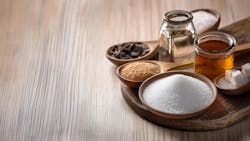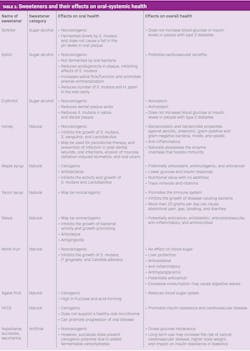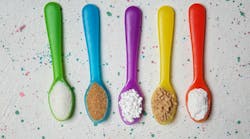Sugar alcohols, natural sweeteners, and oral health: Part 2
Listen to the article on our podcast!
Editor’s note: This is part two of a two-part series. Read part one here.
Natural sweeteners come from natural sources and are minimally processed. Some have calories (honey, maple syrup) while others do not (monk fruit), and they also supply some types of nutrients. Some natural sweeteners may provide health benefits such as lowering blood pressure and blood sugar. See table 1 for a breakdown of sweeteners and their oral-systemic effects.
Honey
Raw honey is a natural substance that is easily tolerable and provides numerous benefits in the oral cavity. Recent studies revealed extracellular vesicles derived from the origin of the honeybee include cargo molecules that contain antibacterial activity against the growth of Streptococcus mutans, Streptococcus sanguinis, and Lactobacillus; thus, the microbiological properties of honey suppressed biofilm-mediated diseases and dental caries.1
Along with antimicrobial/bactericidal properties, honey presents bacteriostatic characteristics that help combat aerobic, anaerobic, gram-
positive and gram-negative bacteria, molds, and yeast.2 For this reason, additional advantages have been studied with periodontal therapy, oral infections, radiotherapy-induced stomatitis, oral ulcers, erosion of mucosa, and oral surgery such as dental extractions.³ Honey assists with pain reduction and contributes to escalating the process of wound healing. It has been recommended for postoperative treatment for all levels of surgeries performed in the oral cavity.3 Unlike other sweets, honey consists of invertase, diastase, and glucose oxidase enzymes.4 However, due to the high levels of sugar content (primarily glucose and fructose), honey must still be used in moderation.
Maple syrup
Pure maple syrup is a minimally processed natural sweetener produced by boiling sap from trees.5 Compared with other natural sweeteners, maple syrup is more desirable than refined sugar due to its favorable characteristics that present a high concentration of phenolic compounds, minerals, and antimutagenic, anticancer, and antioxidant aspects. It has a lower glucose and insulin response than other natural sugars, but we must remember that maple syrup still contains sugars (i.e., sucrose with lesser amounts of glucose and fructose) and should be used in moderation.6
Yacon syrup
Yacon syrup (Smallanthus sonchifolius) is extracted from the leaves of a natural plant.⁷ Yacon syrup consists of prebiotics fructo-oligosaccharides and inulin, as well as a minute amount of glucose and fructose. It is a soluble fiber nearly indigestible in the human digestive system, so it serves the constructive bacteria in the gut by providing nutrients. In turn, this assists the immune system with regulation, represses the growth of bacteria that form disease, promotes food digestion, and generates valuable vitamins. Yacon syrup contains about one-third the calories of sucrose, but it is not as sweet, which could cause individuals to use more. Additionally, if more than 20 grams per day are ingested, side effects such as abdominal pain, gas, bloating, and diarrhea can occur.8
Unfortunately, there has been little research on yacon syrup’s impact on systemic and oral health. It is known that fructo-oligosaccharides are noncariogenic, but one must still be cautious of the cariogenic proclivity that glucose and fructose present.8
Stevia
Stevia (Stevia rebaudiana) is a natural herb with biological properties that assist in the treatment of a multitude of noncommunicable diseases. Stevia supports the treatment of obesity, type 2 diabetes, hypertension, and kidney disease, revealing biological activities as an antidiabetic, anticardiovascular disease, and anti-inflammatory. Stevia helps regulate blood glucose levels and has anticancer properties. Some clinical studies have shown, however, that stevia caused cancer and infertility.9 It has no calories but is 120–300 times sweeter than sucrose,10 and due to its antimicrobial properties, it has received attention as a possible use in oral hygiene products. Research shows that stevia demonstrates antiplaque and antigingivitis properties as well.11
Monk fruit
Siraitia grosvenorii, also known as monk fruit, is an herbaceous perennial plant that is used as a low-calorie natural sweetener. Monk fruit is a small green gourd with juice that is noncariogenic, has a glycemic index of zero, and does not affect blood sugar. The extract is about 150–250 times sweeter than sucrose. It is enriched with antioxidants that allow and assist repression capabilities to battle the production of oral bacterial species, such as yeast Candida albicans, Porphyromonas gingivalis, and Streptococcus mutans.12 Protective health properties including anti-inflammatory and anticancer effects have been shown in pharmacological studies associated with monk fruit. Liver protection has also been linked to monk fruit.10
Although monk fruit is considered noncariogenic, there is little research on its oral effects. Excessive consumption could cause digestive issues such as nausea and upset stomach, and, in high concentrations, an unpleasant aftertaste could occur.10
Agave syrup
Agave syrup, also known as agave nectar, is a sweetener made from the sap of the agave plant. It is considered vegan and has become a popular replacement for traditional sweeteners. It is well advised as an excellent source of minerals and vitamins compared to other sweeteners. However, agave sweetener has a high carbohydrate content with a low glycemic index. It has a high fructose content, making it sweeter than other sweeteners; as a result, less sweetener is needed. Agave is promoted as a calorie-reduced sweetener. Agave can be controversial, some arguing that healthier options are available, but it’s a draw for diabetics who are seeking the reduced blood sugar spike.13 Unfortunately, the elevated levels of fructose are harmful to oral health as the bacteria metabolizes the fructose and forms acid.14
High fructose corn syrup
High fructose corn syrup (HFCS) is a highly processed and controversial natural sugar. Fructose is a lipogenic dietary sugar, which is ultimately synthesized from corn. HFCS can impact gastrointestinal health, blood glucose control, and lipid metabolism. This sugar is also a big promoter of insulin resistance, cardiovascular disease, and does not foster a healthy oral microbiome.15
Artificial sweeteners
Nonnutritive sweeteners (NNS)—such as aspartame, saccharin, and sucralose—are noncariogenic by producing less acid from the suppression of biofilm formation and growth of S. mutans.16 Conversely, they are not known to promote oral health. The formation delivered by the composition properties of artificial sweeteners modifies intestinal microbes, creating a resistance and intolerance to glucose.
Some studies suggest an association with an increased risk of cancer, cardiovascular disease, higher body weight, and an impact on insulin resistance in diabetics.17 Research shows increasing scientific evidence that long-term consumption of drinks sweetened with NNS results in an increased risk for health issues; however, due to the anticariogenic properties of artificial sweeteners, they are still used occasionally.18
Sugar alcohols and prevention
Dental caries, periodontal disease, and oral cancer present current matters of concern worldwide as global health issues. While taking nutrition and diet into account, sugar alcohols can be used as an efficient preventive method to stabilize or halt the progression and advancement of caries development. Sugar alcohols such as xylitol assist this process, as they present a double function against caries production with increased pH levels and increased salivary flow. Anticariogenic properties are present in sugar alcohols, but there is limited data to advocate them to patients as the primary means of caries protection.
There is a substantial amount of research that encourages the advancement and evolution of the caries prevention methods of topical fluorides and dental sealants. Natural sweeteners have antimicrobial effects to help assist with the inhibition of disease-causing bacteria as a line of defense but must be used in moderation. If recommended, they should be used as an adjunct to other preventive approaches. Artificial sweeteners do provide anticariogenic properties, but for some the risk-to-benefit ratio must be considered.18
Editor's note: This article appeared in the October 2024 print edition of RDH magazine. Dental hygienists in North America are eligible for a complimentary print subscription. Sign up here.
References
- Leiva-Sabadini C, Alvarez S, Barrera NP, Schuh CMAP, Aguayo S. Antibacterial effect of honey-derived exosomes containing antimicrobial peptides against oral Streptococci. Int J Nanomedicine. 2021;16:4891-4900. doi:10.2147/IJN.S315040
- Deglovic J, Majtanova N, Majtan J. Antibacterial and antibiofilm effect of honey in the prevention of dental caries: a recent perspective. Foods. 2022;11(17):2670. doi:10.3390/foods11172670
- Mokhtari S, Sanati I, Abdolahy S, Hosseini Z. Evaluation of the effect of honey on the healing of tooth extraction wounds in 4- to 9-year-old children. Niger J Clin Pract. 2019;22(10):1328-1334. doi:10.4103/njcp.njcp_102_19
- Atwa ADA, AbuShahba RY, Mostafa M, Hashem MI. Effect of honey in preventing gingivitis and dental caries in patients undergoing orthodontic treatment. Saudi Dent J. 2014;26(3):108-114. doi:10.1016/j.sdentj.2014.03.001
- Saraiva A, Carrascosa C, Ramos F, Raheem D, Lopes M, Raposo A. Maple syrup: chemical analysis and nutritional profile, health impacts, safety and quality control, and food industry applications. Int J Environ Res Public Health. 2022;19(20):13684. doi:10.3390/ijerph192013684
- Moynihan P. Sugars and dental caries: evidence for setting a recommended threshold for intake. Adv Nutr. 2016;7(1):149-156. doi:10.3945/an.115.009365
- Yan MR, Welch R, Rush EC, Xiang X, Wang X. A sustainable wholesome foodstuff; health effects and potential dietotherapy applications of yacon. Nutrients. 2019;11(11):2632. doi:10.3390/nu11112632
- Alternative sugars: yacon syrup (nectar). Br Dent J. 2017; 223(9): 625. doi:10.1038/sj.bdj.2017.943
- Chowdhury A, Alam MR, Raihan MM, Rahman T, Islam S, Halima O. Effect of stevia leaves (Stevia rebaudiana Bertoni) on diabetes: a systematic review and meta-analysis of preclinical studies. Food Sci Nutr. 2022;10(9):2868-2878. doi:10.1002/fsn3.2904
- Akesowan A, Choonhahirun A. The use of stevia and monk fruit sweeteners for sugar replacement in green tea agar jellies. Food ScienTech J. 2021;3(2):93. doi:33512/fsj.v3i2.12404
- Vandana K, Reddy VC, Sudhir KM, Kumar K, Raju SH, Babu JN. Effectiveness of stevia as a mouthrinse among 12-15-year-old schoolchildren in Nellore district, Andhra Pradesh – a randomized controlled trial. J Indian Soc Periodontol. 2017;21(1):37-43. doi:10.4103/jisp.jisp_54_17
- Shivani, Thakur BK, Mallikarjun CP, et al. Introduction, adaptation and characterization of monk fruit (Siraitia grosvenorii): a non-caloric new natural sweetener. Sci Rep. 2021;11(1):6205. doi:10.1038/s41598-021-85689-2
- Saraiva A, Carrascosa C, Ramos F, Raheem D, Raposo A. Agave syrup: chemical analysis and nutritional profile, applications in the food industry and health impacts. Int J Environ Res Public Health. 2022;19(12):7022. doi:10.3390/ijerph19127022
- Alternative sugars: agave nectar. Br Dent J. 2017;223(4):241. doi:10.1038/sj.bdj.2017.697
- Herman M, Samuel VT. The sweet path to metabolic demise: fructose and lipid synthesis. Trends Endocrinol Metab. 2016;27(10):719-730. doi:10.1016/j.tem.2016.06.005
- Zhu J, Liu J, Li Z, et al. The effects of nonnutritive sweeteners on the cariogenic potential of oral microbiome. Biomed Res Int. 2021;2021:9967035. doi:10.1155/2021/9967035
- Suez J, Korem T, Zeevi D, et al. Artificial sweeteners induce glucose intolerance by altering the gut microbiota. 2014;514(7521):181-186. doi:10.1038/nature13793
- Gupta M. Sugar substitutes: mechanism, availability, current use and safety concerns–an update. Open Access Maced J Med Sci. 2018;6(10):1888-1894. doi:10.3889/oamjms.2018.336
About the Author

Katie L. Pondolfino, BSDH, RDH, MAAL
Katie is an adjunct professor at Empire State University, where she teaches community health, leadership in health care, and health-care ethics; an adjunct professor at the University of Bridgeport in Connecticut, where she teaches dental practice management; and an instructor at SUNY Broome Community College, where she assists with all student levels in the hygiene program. She has 18 years of clinical experience and was a dental coordinator at the Greater Binghamton Health Center, a public health hospital.


